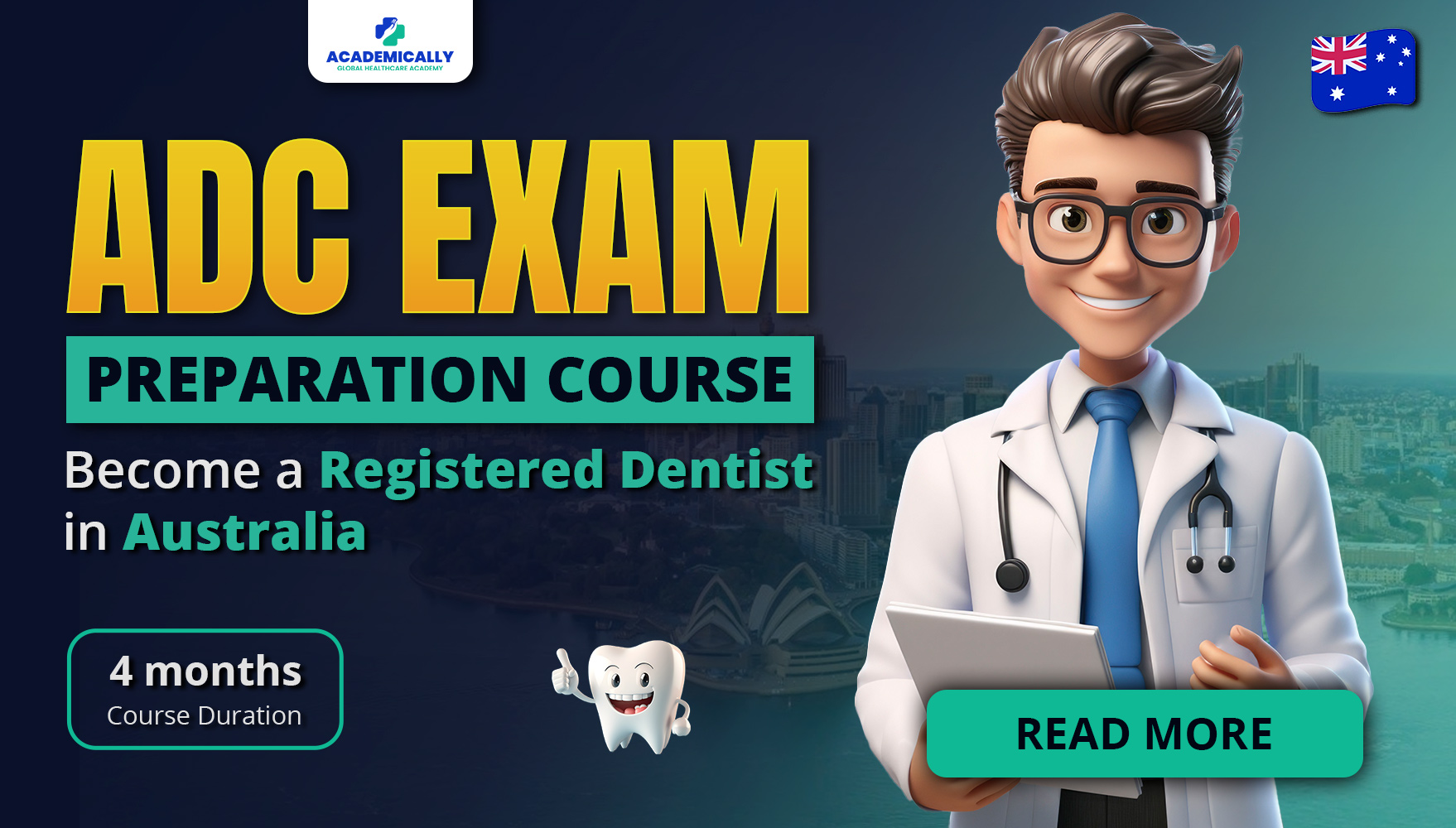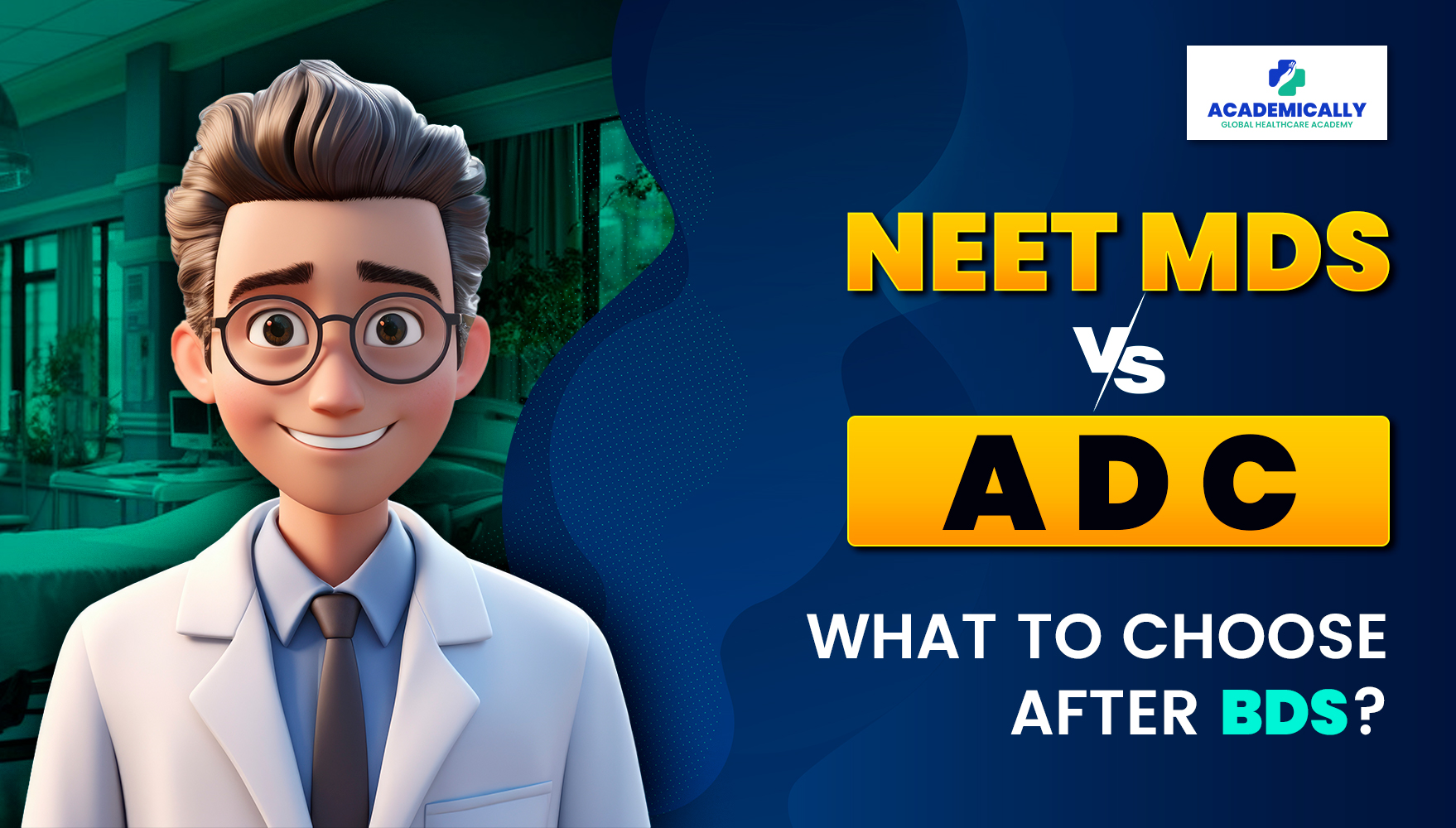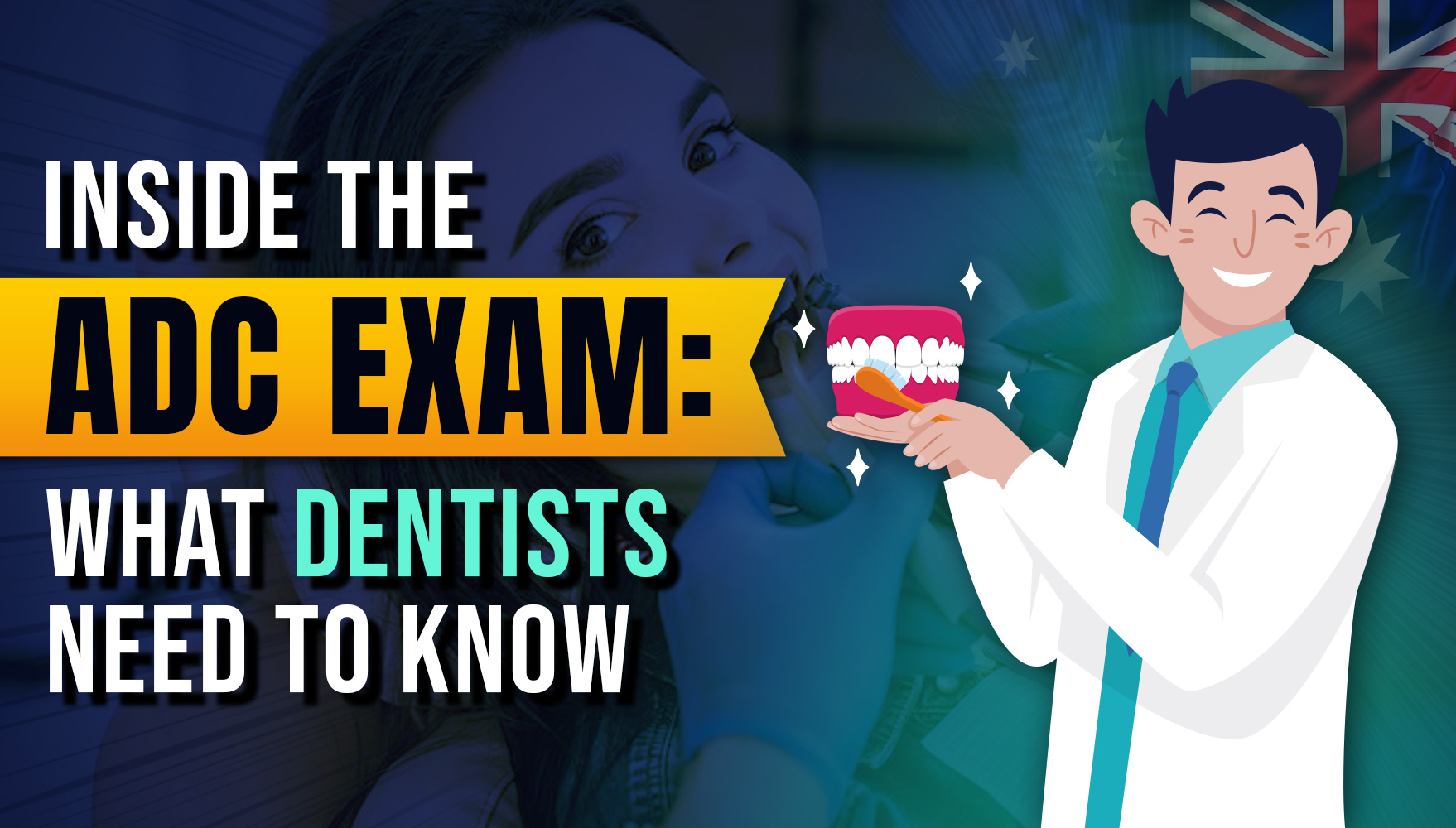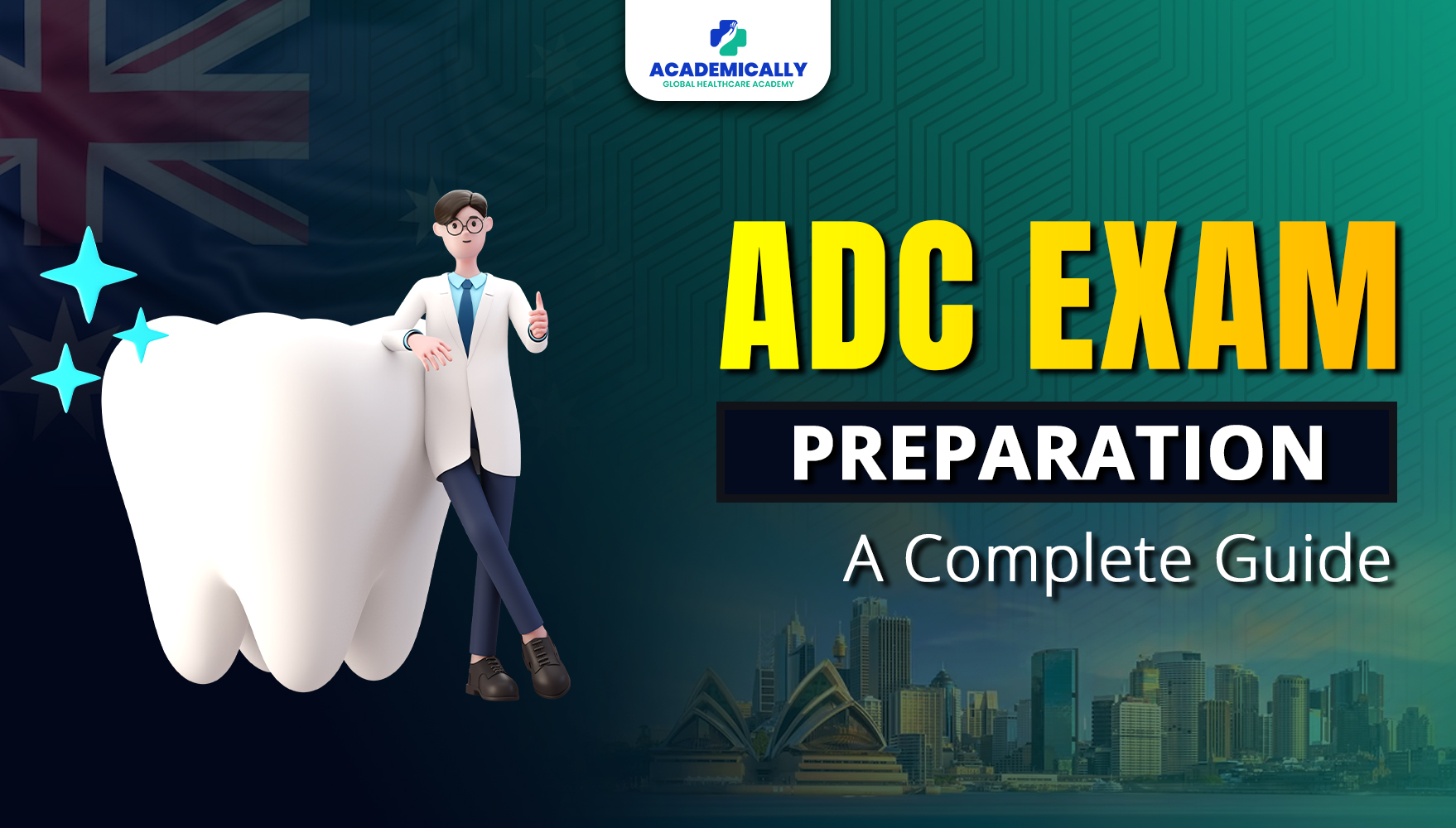NEET MDS
Indian Exam: NEET MDS is tailored to the Indian dental education system. It aligns with the curriculum and requirements of dental colleges within the country, offering a pathway for dentists to specialise within the Indian healthcare framework.
Specialisation Options: NEET MDS provides access to many specialisation options, including Orthodontics, Prosthodontics, Oral and Maxillofacial Surgery, Periodontology, and more. This allows candidates to choose a field that aligns with their interests and career goals.
Competition and Availability: Due to the high number of applicants and limited seats in reputed institutions, NEET MDS can be highly competitive. Securing a good rank is essential for admission to top-tier dental colleges offering quality education and training.
ADC
International Recognition: ADC assessment opens doors to practising dentistry in Australia, a country known for its high healthcare and dental services standards. For dentists seeking international exposure and opportunities, ADC provides a pathway to pursue their career goals in a different cultural and professional environment.
Assessment Process: ADC conducts a rigorous assessment that evaluates candidates' clinical knowledge, skills, and competence to ensure they meet the standards required to practise dentistry in Australia. This process typically involves written and clinical examinations.
Career Prospects: Completing the ADC assessment opens up opportunities for employment in Australia, whether in private practices, hospitals, community health centres, or academic institutions. It also offers the possibility of eventual permanent residency for those interested in settling down in Australia.
Eligibility
For NEET-MDS, the candidate must have
- A valid BDS degree from a recognised dental institution in India.
- A valid provisional or permanent registration certificate issued by the Dental Council of India (DCI) or the State Dental Council (SDC).
- Completion of the mandatory rotating internship on or before the specified date.
For AMC, the candidate must have
- A minimum of four-year dental degree from a recognised institution.
- Completion of the compulsory rotatory internship after attaining the degree.
- Full and unrestricted registration in your home country or country of training without withdrawal of the registration.
Exam Format
While NEET MDS is a single-step exam conducted only in India, ADC is a two-step examination. ADC Written is a computer-based test, and ADC Clinical is a practical examination.
Both NEET MDS and ADC aim to assess candidates' comprehensive understanding of medical knowledge and proficiency in clinical skills.
| Categories | NEET PG | ADC Written | ADC Clinical |
| Exam Mode | Computer-based | Computer-based | At the examination centre in Melbourne or online |
| Question Type | Multiple Choice Questions | Multiple Choice Questions | Clinical Examination |
| Duration of the Exam | 3 hours 30 mins | 4 sections, each consisting of 2 hours | 2 days |
| Number of Questions | 200 | 280 (70 in each section) | 6 tasks and 10-stations |
| Total Marks | 800 | No set mark | Marked by examiners using borderline regression |
| Marking Scheme | 4 marks for correct answer & -1 for incorrect answer | Measurement of the candidate’s ability level | Global rating on a five-point scale |
| Total Number of Attempts | No limit | No limit | No limit |
| Syllabus | All subjects from the BDS curriculum | Based on the undergraduate dental syllabus | Based on the undergraduate dental syllabus |
Choosing the Right Path
When deciding between NEET MDS and ADC, it's essential to consider your career aspirations, personal circumstances, and long-term goals. Here are some factors to weigh:
Location Preference: If you aspire to practise dentistry in India and specialise within the Indian healthcare system, NEET MDS might be the more suitable option. However, if you're open to exploring international opportunities and willing to relocate, ADC could offer a broader scope for your career.
Specialisation and Training: Evaluate the specialisation options available through NEET MDS and consider whether they align with your interests and career objectives. Similarly, research the training and professional development opportunities ADC offers to ensure they meet your needs and expectations.
Competitiveness and Preparation: Understand the level of competition associated with NEET MDS and assess your preparedness for the entrance exam. Likewise, familiarise yourself with the requirements and standards of the ADC assessment process and determine if you're ready to undertake the challenge.
Long-Term Goals: Reflect on your long-term career goals and how each pathway aligns. When deciding, consider factors such as professional growth, job satisfaction, work-life balance, and potential for advancement.
Pros and Cons
NEET MDS in India
| Pros | Cons |
| Familiarity: For Indian dental graduates, NEET MDS offers a familiar educational system, language, and cultural environment. | Limited Global Recognition: While an MDS degree from India is recognized within the country, it may not hold the same level of recognition internationally, potentially limiting career opportunities abroad. |
| Cost-effective: Pursuing MDS in India is often more cost-effective compared to studying abroad, especially when factoring in tuition fees, living expenses, and currency exchange rates. | Competitive Entrance Exam: NEET MDS is highly competitive, with a large number of candidates vying for limited seats, making it challenging to secure admission into preferred institutions. |
| Wide Range of Specialisations: NEET MDS provides access to various specialisations in dentistry, allowing candidates to choose a field that aligns with their interests and career goals. | Quality of Education: While some institutions in India offer world-class dental education, the quality of education can vary across different colleges, impacting the overall learning experience. |
| Networking: Studying in India allows dentists to network with fellow professionals, professors, and potential employers within the Indian dental community. | Limited Exposure to International Standards: Studying in India may offer limited exposure to international standards and practices in dentistry, which could be a disadvantage for those aiming for a global career. |
ADC Examination in Australia
| Pros | Cons |
| Global Recognition: Passing the ADC examination opens doors to practise dentistry in Australia, as well as in countries that recognise Australian dental qualifications, providing broader career prospects. | Financial Investment: Pursuing studies abroad, particularly in countries like Australia, entails significant financial investment in terms of tuition fees, living expenses, visa fees, and relocation costs. |
| High Standard of Education: Australia is known for its high-quality education system, offering exposure to advanced techniques, technology, and research in dentistry. | Adaptation Challenges: Moving to a new country involves adapting to a different healthcare system, cultural norms, and lifestyle, which can be challenging for some individuals. |
| Diverse Opportunities: Dentists who qualify through the ADC examination have the opportunity to work in diverse settings, including public hospitals, private practices, research institutions, and academia. | Competitive Process: The ADC examination is rigorous and competitive, requiring thorough preparation and dedication to pass successfully. |
| Personal and Professional Growth: Living and studying abroad can be a transformative experience, fostering personal growth, cultural understanding, and professional development. | Limited Access to Home Country: Studying abroad may result in limited access to family, friends, and professional networks in one's home country, which can be a drawback for some individuals. |
Finally
The decision between NEET MDS and ADC after BDS depends on various factors such as career aspirations, financial resources, personal preferences, and willingness to adapt to new environments.
Both paths offer unique opportunities for professional growth and advancement in the field of dentistry. It's essential for aspiring dentists to thoroughly research and evaluate their options before making a well-informed decision that aligns with their goals and aspirations.
If your choice is ADC Exam, join a specially designed course by Academically- ADC Preparation Course.

You will get all the study resources, mock exams, expert guidance and much more.
Fill up this form for a free one on one counselling session.






